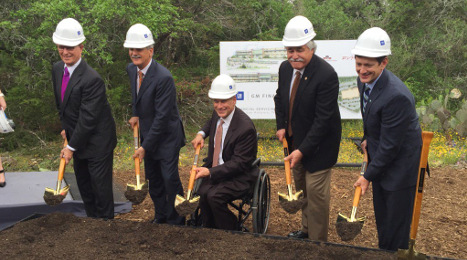Findings from a recent Autotrader survey released on Wednesday showed 70 percent of respondents expect to receive a tax refund this year.
Perhaps better yet for dealerships and finance companies, Autotrader’s survey conducted in February that included 550 U.S. adults contained information that might goose turns and originations. Site officials highlighted that of the 27 percent of survey respondents who plan to spend their refund on a car-related expense, 61 percent are looking to purchase a new or used vehicle.
“There's nothing like a sudden influx of cash to spur on big purchases, and tax refunds make for great down payments on new and used cars,” Autotrader senior analyst Michelle Krebs said. “However, it’s important for car shoppers to be smart about the purchase, being sure to get the right car for their needs that fits nicely into their budgets.”
If a shopper comes to your store’s website or showroom not ready to sign a contract for the most expensive vehicle in inventory, Autotrader’s editors recommended what they think are the 10 best used cars now available and easy to find for a retail price of $13,000 or less:
2012-2015 Chevrolet Sonic
2007-2012 Mazda CX-9
2010-2012 Ford Fusion
2003-2008 Nissan 350Z
2005-2010 Honda Odyssey
2005-2012 Nissan Frontier
2006-2011 Hyundai Azera
2010-2015 Subaru Outback
2010-2014 Kia Soul
2006-2012 Toyota RAV4
A wide array of technology providers in the auto finance space — including EFG Companies, F&I Express, RouteOne, National Credit Center and eLEND Solutions — all recently either formed new partnerships or rolled out enhancements to their solutions aimed at helping dealerships and finance companies.
The latest development spotted by SubPrime Auto Finance News was the enhanced partnership forged by EFG Companies and F&I Express. The organization created the partnership to better serve their dealership clients by fully integrating their eContracting capabilities.
“At EFG Companies, we understand that no two dealers are the same,” said John Pappanastos, president and chief executive officer of EFG Companies.
“Each dealer operates with different goals, success metrics, and systems, and we pride ourselves in acting as a strategic partner in their success,” Pappanastos continued. “In our effort to further that initiative, we partnered with F&I Express to augment our growing list of e-contracting solutions with one of the most utilized eContracting platforms in the market.”
F&I Express president and CEO Brian Reed added, “For almost 40 years, EFG Companies has been leading innovation within the automotive industry. We have been eagerly anticipating their addition to our F&I eContracting network and look forward to bringing their products to our dealer customers.”
RouteOne launches new desking product
RouteOne recently launched what the company dubbed RouteOne Desking; a new product that can enable dealers to quickly calculate and present monthly payment options to their customers.
The company highlighted that RouteOne Desking covers multiple sales types, including lease, retail and cash deals.
RouteOne Desking features rates, incentives, and residual values from captives and a wide array of finance sources. It also can check for rebate and program compatibility to help reduce errors and the need for manual verifications. It includes dealer configurable options, such as taxes and fees, and default aftermarket values to allow for room on the back-end when the deal moves into F&I.
Once a deal has been desked, all the data from it can generate a credit application, in RouteOne, with the simple click of a button.
“RouteOne’s Desking tool is excellent. The integration is great, however what sets it apart for me is the look and functionality of the customer proposals,” said Jesse Akins, sales manager at Pace Chevrolet in Reidsville, N.C.
RouteOne chief executive officer Mike Jurecki acknowledged, “There are many outstanding desking solutions in the marketplace today, which we will continue to integrate with to fully support dealer choice. So we didn’t get into the business just to get into it.
“We got into desking because our customers asked us to,” Jurecki continued. “They wanted an easy way to consistently calculate payment across all channels that integrates directly into the RouteOne workflow that they are so comfortable with and count on for its reliability. With the launch of this new product, they are able to do just that.”
For more information, dealers can visit www.routeone.com/desking or call (866) 768-8301.
National Credit Center unveils Avendas CRM
National Credit Center (NCC), a provider of comprehensive credit reporting solutions, data and marketing solutions recently rolled out its new customer relationship management technology product — Avendas CRM.
Designed to work with NCC's dealer clients to enhance their customer's experience, Avendas CRM is designed so dealers spend less time using software to locate requisite data, and more time communicating effectively with their customers.
Built on what NCC contends is a responsive, cloud-based platform, Avendas CRM can allows for full functionality and the best experience on any device.
“For two decades, National Credit Center has been on the forefront of innovation in the automotive sector, and that tradition continues with the introduction of Avendas CRM," said Jevin Sackett, chief executive officer of NCC parent company Sackett National Holdings (SNH).
“In developing Avendas CRM, we’ve invested more than 20,000 hours in coding alone, with countless additional hours dedicated to ideation, workflow, and UI/UX. Our automotive professionals spent thousands of hours conducting A/B testing with dealers and industry experts, then used their suggestions and feedback to enhance the product,” Sackett continued.
“The resulting system reflects the wealth of resources we've used to develop this innovative CRM,” Sackett went on to say. “Avendas CRM was designed to minimize the time required to deliver the right message, to the right customer, at the right time."
Understanding the critical importance that time management plays in the automotive industry, Avendas CRM is designed so that dealership staff can be fully trained in a few days, through either in-store training or via online, instructor-led classes. One of the goals of Avendas CRM was to free up dealer staff to interact more with customers, instead of spending time using software to find the necessary data and information required to communicate effectively with customers.
“Avendas CRM was developed to keep pace with the modern methods dealers use to manage their customers' experience,” said Shawn Morse, NCC’s senior vice-president of software solutions. “Currently, the most widely used CRM platforms in the automotive sector were built before the iPhone and Facebook were even released.
“As a result, in our consultations with dealers during Avendas’ development, we heard that many CRM systems weren't optimized for today’s technology, and that resulted in deficiencies in a host of areas — including reporting, email deliverability, security and the ease of use of their existing CRMs,” Morse continued.
“Avendas CRM was developed specifically to address the concerns that dealers identified with their existing CRM systems. As a result, Avendas is designed to provide a cost-effective, modern, intuitive CRM system that gives complete control of actionable data, process management, marketing, security, and reporting back to our dealer clients,” Morse added.
With more than 5,000 dealership partners nationwide, NCC said it was critical that Avendas CRM complement the company’s existing products. As a result, Avendas CRM also was designed to work seamlessly with the NCC credit portal (NCCI), giving dealers powerful customer data in the most efficient way possible.
“With its ease of use, flexibility, customizability and value, Avendas CRM is breaking new ground in the field of automotive CRM,” the company said. “Designed, tested, and then enhanced by industry experts who use CRM daily, Avendas CRM will transform the way dealers manage new and existing customer relationships.”
For more information, visit www.NCCdirect.com.
eLEND Solutions’ ID Drive to generate soft-pull credit report
Executives from eLEND Solutions recently announced that their ID authentication program now instantly and automatically can convert a driver’s license scan into a consumer consented soft pull credit pre-qualification application, without even requiring a Social Security Number.
Initial results from California-based Huntington Beach Chrysler Dodge Jeep Ram show a 36-percent conversion ratio using ID Drive pre-qualification and a dramatically shortened sales cycle.
“In the first month, we scanned nearly 900 driver’s licenses — capturing the relevant data in our in-store systems, giving us an accurate record of who has driven our vehicles — of those scanned, nearly 50 percent opted for pre-qualification and we converted 36 percent of those into a sale — making it one of our highest performing and most profitable channels,” said Pete Shaver, managing partner of Huntington Beach Jeep.
“And because the process is so fast and easy, we can verify their address and pull credit in less than 10 seconds. We are saving a huge amount of manpower and time,” Shaver added.
Having this information up front enabled Huntington Beach Chrysler Dodge Jeep Ram to shave an estimated one to two hours off the sales process — what eLEND Soluations called a huge upside for both the dealership and the customer.
Shaver also confirmed that the simplified pre-qualification process directly impacts customer satisfaction.
“Customers appreciate not having to share their SSN and knowing there won’t be any negative impact on their credit score — and they love the fact that it shortens the sales cycle,” Shaver said.
Pete MacInnis, chief executive officer of eLEND Solutions explained that ID Drive’s pre-qualification differs from pre-screening or hard pull inquiries because it does not require a SSN or impact the consumer’s credit profile while providing the dealer with a full credit report and real-time credit score.
“This new enhancement is designed to help dealers sell more cars in less time, improve CSI by reducing bottle necks in the F&I department and improve overall profitability,” MacInnis said. “We are giving dealers the information they need to put customers in the right vehicles with the right deal structures, matched to specific lender programs at the front of the sales process.”
In addition, MacInnis pointed out that ID Drive is the only driver license scanner that can authenticate every version of driver license for all 50 states, appending validated address and phone information, and automatically can convert a driver license scan into a consumer consented pre-qualification application.
Once scanned, the consumer’s lead information is electronically integrated with any pre-existing lead or credit application data — prior to the test drive — then securely exported into the dealer’s CRM and finance systems, integrating the historically fragmented sales and finance processes.
The company added that ID Drive’s Pre-qualification also includes much lower costs per credit pull and simplified compliance requirements and cost savings for dealers.
ID Drive’s pre-qualification function can work hand-in-hand with eLEND’s CreditPlus program which instantly pre-qualifies customers based on dealer-defined credit criteria, giving car buyers direct, upfront access to dealership financing sources and real near-final terms from multiple finance companies, all of which are controlled by the dealer.
For more information, visit www.elendsolutions.com.
The volume of auto-financing discussion — especially in the subprime space — Cox Automotive chief economist Tom Webb entertained at recent industry events and his quarterly conference call prompted him to ask a question.
Recent analyst reports from Fitch Ratings and Moody’s Investors Service highlighted deterioration in performance in the subprime auto ABS market, prompting several of the investment analysts who join Webb’s quarterly call to inquire about whether financing availability, particularly in the subprime space, is about to be reduced.
“The subprime area certainly has gotten a lot of notice as of late. And I’m actually beginning to question myself in that am I missing something? I think the cycle has longer to run simply because for the most part we’re in a low-interest rate environment so there’s a search for yield and auto loans provide that yield with very low risk actually,” said Webb, who hosted the call last week on the heels of being in Las Vegas for conferences orchestrated by the American Financial Services Association and the National Automobile Dealers Association.
“There’s certainly been some reports now of some smaller players in the subprime and new players in the subprime area; players that are doing something that really hasn’t been done before in terms of alternative measures in order to provide credit to people who have absolutely no credit history,” he continued.
“You would expect that there would be a little volatility,” Webb went on to say. “Whether it crops back up into the bigger subprime market, you have to be concerned when you get a lot of reports along those lines. However I do believe it will remain favorable for the used-vehicle environment. It’s extremely important for the used-vehicle environment.”
Some of those smaller finance companies were pinpointed by Moody’s in its report, which Webb acknowledged, “was a little more troubling for me; although these numbers really have not been a secret.” He then explained what can happen when ratings agencies such as Fitch and Moody’s push out a series of negative assessments about what’s happening in the space.
“To a certain extent as the ratings agencies get nervous, they can make their own predictions come true if you start dialing back on availability or changing the amount of enhancement that has to go into the ABS,” Webb said.
“Again, the overall financial market remains relatively flush with liquidity,” he continued. “Generally speaking, most delinquencies have not spiked in term of the overall numbers, and people do make their payments except when they have the shock of a job loss, illness or divorce; those three prime reasons.
“If the underwriting standards weren’t completely off the mark then you would think that the loans would continue to perform well. Again, the problems we’ve seen are from some very small players,” he added.
While the latest assessment about delinquency from the American Bankers Association’s Consumer Credit Delinquency Bulletin doesn’t carve out subprime financing specifically, the organization noticed only a slight uptick in auto finance delinquencies in the fourth quarter.
ABA indicated direct auto loan delinquencies — contracts arranged directly through a bank — rose from 0.74 percent to 0.75 percent. The association added that indirect auto loan delinquencies — financing arranged through a third party such as a dealer — climbed from 1.51 percent to 1.54 percent.
The composite ratio, which tracks delinquencies in eight closed-end installment loan categories, remained at 1.41 percent of all accounts in the fourth quarter, according to the bulletin. ABA pointed out that what fueled the overall reading was home-related delinquencies were down significantly in two out of three categories, with home equity loan and line delinquencies continuing a downward trend and approaching their 15-year averages for the first time since the recession.
“It’s been a long, rocky road, but home equity delinquencies have finally worked their way back to historical norms,” ABA chief economist James Chessen said. “The strong and consistent rise in home prices over the last three years has restored equity, which makes keeping loans current even more of a top priority for homeowners. With rising home equity and shrinking delinquencies becoming the status quo, banks are more willing to extend new home equity loans and lines to qualified borrowers.”
Chessen is anticipating that continued consumer discipline and steady economic conditions will help keep delinquencies near historically low levels for the foreseeable future.
“The national savings rate is at one of its healthiest points since the recession and trending upward, which means people are well-positioned to repay their debts,” Chessen said. “Disciplined saving, along with steady job growth and climbing household wealth, signal that delinquency levels are likely stay near these historic lows for some time.”
But in the auto finance world, a metric to watch might be softening vehicle prices as the Manheim Used Vehicle Value Index is now on a streak of three consecutive months of declines. Should vehicle wholesale prices tumble significantly, Webb recognized that the trend could magnify what’s happening in the auto ABS space.
“We sometimes call it that there is a virtuous circle that can sometimes can turn into a vicious circle,” Webb said. “The virtuous circle is what we have had so far in this recovery where the recovery rates on any repossessions are extremely high, which gives the lenders more confidence to lend and make credit available.
“Of course, each one of those repossessions has to go back out and be re-retailed usually with a subprime loan attached to it. That just keep the cycle going,” he continued.
“Once recovery rates become poor, then the credit availability starts to dial back in and with credit availability dialing back in, your recovery rates fall further,” Webb went on to say. “A significant fall-off in used-vehicle values would hurt those recovery rates. But certainly as they say, the frequency of the loss is much more important than the severity of the loss.
“It can become a self-fulfilling vicious circle,” he added. “I don’t think we’re there yet in terms of wholesale pricing. But if credit availability were to dial back substantially then yes, you’re going to hurt used-vehicle values by that factor.”
General Motors Financial broke ground on Monday for its new financial servicing center in San Antonio during a ceremony that featured several notable city, county and state officials and community leaders as speakers, including Gov. Greg Abbott.
The company’s newest facility consisting of 100,000 square feet is planned to be built on 13.8 acres of land off of Raymond E. Stotzer Freeway at the intersection of Westover Link and North Ellison Drive. Construction is targeted to begin this spring, and the company plans to begin occupying the building in the spring of next year.
“We are proud to call San Antonio the future home of our fifth servicing center in North America, and excited to break ground on this new facility with the support and partnership of leaders from the city of San Antonio, Bexar County and the state of Texas,” said GM Financial chief executive officer Dan Berce.
“GM and GM Financial are committed to maintaining strong ties to this state, where combined we employ more than 10,000 people dedicated to building world-class vehicles and providing auto financing solutions to GM’s customers and dealers,” Berce continued.
Since becoming General Motors’ captive finance company in 2010, GM Financial has actively expanded its capabilities and now offers a broad spectrum of auto financing solutions, including loan, lease and commercial financing products, to 16,000 dealers worldwide.
GM Financial, which employs approximately 6,700 team members in the U.S. and Canada, also has financial servicing centers in:
—Arlington, Texas
—Chandler, Ariz.
—Huntersville, N.C.
—Peterborough, Ontario
The company also has 18 credit centers across the U.S. and Canada, including one in San Antonio, Texas. GM Financial is headquartered in Fort Worth, Texas.
The company highlighted its new San Antonio servicing center represents GM Financial’s continued strategic expansion and support of GM, as well as demonstrates the company’s strong and positive presence in the state of Texas. This new facility could bring up to 700 jobs to the San Antonio community and potentially drive more than $300 million in total economic output in the first 10 years of operation, according to analysis conducted by Impact DataSource.
“Texas’ welcoming business climate of low taxes and low regulations has propelled the Lone Star State to be a leader in job creation,” Abbott said. “I am proud that GM Financial has chosen San Antonio as the site of its next financial servicing center, creating nearly 500 jobs and investing tens of millions of dollars in the Texas economy.
“As governor, I will continue to pursue policies that keep Texas the premier state for doing business, creating more opportunity and more jobs for Texas families,” he added.
Texas House Speaker Joe Straus, a Republican from San Antonio added, “GM Financial is making a meaningful investment in our community. These jobs will provide new opportunities for our citizens and benefit our larger economy here in San Antonio. Texas continues to be a place that invites and encourages private-sector growth.”
As GrooveCar significantly broadened its network of partners, PenFed Credit Union forged a relationship with CU Direct and the CUDL Network during last week’s NADA Convention & Expo with the expectation of increasing member loans and enhancing overall efficiencies with dealerships.
Beyond the growth in membership and assets, PenFed sees this new partnership as a way to raise awareness of its brand and build strategic business relationships with dealers across the country.
“Growth is a key part of the equation when it comes to PenFed’s ability to consistently deliver low-cost financing for its members,” said James Schenck, president and chief executive officer of PenFed, which boasts 1.4 million members worldwide with nearly $20 billion in assets.
“Joining CU Direct gives us the ability to provide a car buyer with the opportunity to seamlessly apply for membership with PenFed while they simultaneously apply for one of our low rate auto loans,” Schenck continued.
In the past 10 years, CU Direct indicated credit unions have more than doubled auto lending.
With the support of CU Direct's auto lending network, executives believe PenFed Credit Union will offer distinct advantages to both vehicle buyers and dealers. The CU Direct Network will allow PenFed to connect with more than 12,500 dealerships across the U.S. and help to increase their membership and loan volume.
PenFed chief operating officer and executive vice president for business development and community/government affairs Tammy Darvish said, “Partnering with CU Direct and gaining access to its dealer network provides PenFed with an opportunity to establish a presence in new markets, while building greater brand awareness nationwide."
Darvish, a former dealer, mentioned dealerships will also have access to some of the lowest auto loan rates in the country offered by PenFed, which is passed on to buyers. She added the result is a win-win-win for PenFed members, the credit union, and their dealer partners.
In addition, PenFed will offer a unique risk-adjusted pricing approach to new- and used-vehicle financing. PenFed does not require money down on any make or model of vehicle, regardless of year of manufacture. Nor does it increase the interest rate based on the model year of the car.
Executives added that dealers will benefit from this partnership by gaining the ability to build in the costs of aftermarket products into PenFed’s loans.
“The landscape of lending is changing and credit unions like PenFed can see the potential for auto lending growth in front of them," said Tony Boutelle, president and CEO of CU Direct.
“Auto loans are leading portfolio growth for many credit unions across the nation,” Boutelle continued. “We’re excited to partner with PenFed in this effort to bring even more value to auto lending programs for their members.”
GrooveCar adds 40 new credit union partners
GrooveCar, a vehicle buying resource for credit unions and their members, recently brought on 40 new partners, expanding into 19 states. That group includes:
District of Columbia
PEPCO
Florida
Miami FCU
Santa Rosa County
Illinois
Aurora Policemen
Bloomington Postal Employees
Champaign County School Employees
Danville Bell Credit Union
Landmark
Pittsburgh Central
Planites
Tee-Pak Credit Union
Michigan
Motor City Co-op
Polish-American
TLC Community Credit Union
Western Districts Members CU
New Jersey
Credit Union of New Jersey
United Teletech Financial
New York
American Broadcast Employees
CAP COM
Community Resource
Encompass Niagara
FASNY
Health Employees
Northeast Alliance
Rochester Area State Employees
School Systems
Utica Gas & Electric
North Carolina
Ecusta
Ohio
Beacon Mutual
Cincinnati Employee
Tennessee
First Choice Community
Texas
Bayou City
Fannin
HEB Federal
Lubbock Teachers
Members Trust of the Southwest
Northeast Panhandle Teachers
Postel Family
Texhillco School Employees
Virginia
Patent & Trademark Office
The GrooveCar program comes with technical and marketing support to ensure all aspects of the program are easily deployed, usually within a week. Once the decision is made to join, implementation includes a tutorial covering all aspects of the drop and drag format and then a marketing meeting to discuss goals and collateral support materials.
The company added ongoing support, marketing consultations, co-branded materials and guidance are included with most of the packages.
“Auto buying is hitting historic heights and the competition for members’ auto loan dollars is stiff. Our platform is known for delivering a car buying experience to members with all the resources necessary for credit unions to compete at the highest level. The website is loaded with features to capture a member’s interest and generate auto loan leads,” GrooveCar vice president of strategic alliances Rob O’Hara said.
GrooveCar launched its new mobile-responsive vehicle-buying website, earlier this year. GrooveCar insisted credit unions and their members are enjoying next generation design elements, ease of use and the newest enhancements to increase the car shopping experience online.
“SUPRtec (Smart User Preference Resource Technology) is the horsepower behind the site, making it unique to the online buying community. This next generation technology streamlines the user’s preferences, getting them to the car of their dreams,” O’Hara said.
Credit unions earned a 17.6 percent share of the overall vehicle financing market as reported by Experian Automotive.
“Auto loans are the credit unions’ bread and butter,” O’Hara said. “For many credit unions, they recognize a plug and play program is the only way to go. Why try to piece together a product with local dealers, manage it and at the end of the day still not be able to fully provide the resources necessary to run a program of this caliber?”
GrooveCar works with credit unions to provide strong local inventory listing while also utilizing existing relationships a credit union may have with dealerships. Nationally, the program boasts more than 4 million vehicles in inventory.
DriveTime passed another juncture on its “longer-term corporate roadmap” on Tuesday as the company continues to pivot away from the traditional buy-here, pay-here model of selling, financing and servicing vehicle sales to subprime customers.
Tuesday marked the official launch of Bridgecrest Acceptance, a licensed third-party servicer for servicing installment contracts for DriveTime and other affiliated finance companies. DriveTime vice president Greg Sax explained to SubPrime Auto Finance News how the company arrived at this point; a journey that began nearly a decade ago.
In 2007, DriveTime started to include prices on its vehicle window stickers in an effort to have a “no-haggle” atmosphere at dealerships. Then three years later, the company removed collectors from dealerships as customers no longer had to make their installment payments at a DriveTime store. When 2013 arrived, DriveTime chose to unbundle its ancillary products and made them optional during the financing process.
Now this week, the company separated its brands with DriveTime representing the retail side and Bridgecrest Acceptance designating the servicing side.
“It’s been on our roadmap for a long time now to get to this point,” Sax said.
Sax highlighted that DriveTime formed a project team last summer and that group went to work beginning in October to get Bridgecrest Acceptance ready for business. The team had to ensure processors at retailers such as Walmart recognized the new servicing brand so customers received proper credit for payments. The group also revamped the website where customers managed their accounts.
Now, all retroactive and new installment contracts that were previously serviced by DriveTime Acceptance Corp. now will be serviced by Bridgecrest Acceptance. That portfolio currently consists of more than 220,000 accounts.
On the remarketing side, Sax also told SubPrime Auto Finance News about how much work had to be completed so dealers at auctions would recognize Bridgecrest Acceptance now represents DriveTime, “ensuring our usual buyers who come to the auctions for the DriveTime products now know that our new name is Bridgecrest for a seamless transition so we get the same participation at the auction as we always would.”
While the company has made a wide array of changes with respect to Bridgecrest Acceptance, Sax shared what parts are remaining constant.
“On the underwriting front, we aren’t making any changes on how DriveTime handles its risk management and underwriting policies and practices,” Sax said. “Our proprietary credit grading model that’s on generation eight now — that’s the backbone to all of the centralized risk management decisioning that we do — that’s staying the same.
“All of the underwriters in our dealerships and the policies and procedures they follow will be the same,” he added.
As a third-party servicer, Bridgecrest Acceptance can still keep a connection to its BHPH roots as the structure of the company can give it the option of purchasing bulk portfolios from dealers.
Might Bridgecrest Acceptance venture into the indirect space, too?
“We’re not positioning Bridgecrest that way,” Sax replied. “We will continue to service loans originated by the DriveTime dealership base. We’re not looking to get into the indirect space.
“I would view Bridgecrest simply as an end-to-end servicing company that can do everything from your customer service and early delinquency disciplines all the way to your back-end collections recovery, skip-tracing, repossession and ultimately remarketing of vehicles at auction,” he continued. “That’s really what Bridgecrest is about, that servicing operation in an end-to-end capability.
“While we’re not actively pursuing outside portfolios today, it opens up the possibility in the longer term that we could do that if we chose to,” Sax went on to say.
In order to handle the volume generated by DriveTime stores as well as the possibilities farther down its corporate road, Sax shared that the Bridgecrest Acceptance already is working on a collections systems to be rolled out later this year or early in 2017. Bridgecrest Acceptance also expects to hire more personnel for both of its operations centers in Mesa, Ariz., and Dallas; a minimum of 20 people each month through the end of the year to fulfill growing loan servicing needs.
Whether its seasoned employees or new additions, Sax emphasized another element of Bridgecrest Acceptance’s workforce.
“Obviously compliance is at the forefront today, especially when you’re looking at the servicing side of the business,” Sax said. “DriveTime and Bridgecrest have a very strong focus and commitment on compliance.
“Our view of it is that the better we get at it, the bigger of a competitive advantage it will be in the future for us,” he continued. “Companies have to have a pretty strong commitment as well as the resources and ability to invest on the compliance side to be a leader in the space.
“We feel as we continue to get out in front of it — the more that we are able to move that ball forward — the more it separates us from others in the servicing space,” Sax added.
Organizers from the American Financial Services Association indicated this week’s Vehicle Finance Conference “was once again a huge success.”
More than 600 attendees and exhibitors gathered at Caesar's Palace in Las Vegas for three days of presentations, panel discussions and networking during AFSA’s 20th edition of the event aimed at allowing finance company executives the chance to interact with each other as well as service providers and other special guests.
According to association’s recap of the conference shared through its weekly Newsbriefs, the series of events started on Tuesday with AFSA president and chief executive officer Chris Stinebert sitting down with a panel of economists and industry leaders to talk about the state of the auto finance space.
Apple co-Founder Steve Wozniak surprised conference attendees when he arrived in Las Vegas to introduce Kevin Mitnick, who some consider to be the world’s greatest hacker.
A cautionary tale on cyber security came from Mitnick, who warned attendees that they and their companies are at risk from hackers every day. Mitnick now helps a variety of businesses and individuals ensure that they don’t fall prey to the association described as “digital mayhem.”
AFSA added, “Mitnick’s presentation and demonstration talked about technology, but also importantly, talked about the social aspect of hacking, or how hackers use non-technological means to steal the information they need from employees and other targets.”
To start off the second day, Stinebert shared updates about future AFSA initiatives. Ginger Herring, who is the AFSA Education Foundation chair and president of 1st Franklin Corp., also took the stage and reviewed important developments that the AFSAEF is undertaking.
AFSAPAC chair Martin Less, who is president and CEO of Nationwide Acceptance, informed attendees about the “great” work the PAC is doing in Washington, D.C.
Later on Wednesday morning, AFSA highlighted that keynote speaker Frank Luntz dazzled attendees with an entertaining and insightful presentation packed with statistics and best practices for word usage. Luntz highlighted critical differences between male and female audiences and the best words or phrases to use with each gender.
Luntz also gave attendees with actionable communication examples that they can implement immediately.
“If I could leave you with once phrase, it would be to ensure you tell consumers that you want to provide them options, but Washington and regulators are keeping you from providing them,” Luntz said.
The conference’s general sessions on Wednesday afternoon got underway with a look into the vehicle-sharing market and an enlightening talk on hiring and retaining millennials.
“Auto finance will be the gateway for millennials to get involved in financial services,” said Jason Dorsey, who is chief strategy officer and millennials researcher at The Center for Generational Kinetics.
Concurrent education sessions highlighted a number of issues, including profitability, compliance relationships with dealers and FIS’ Vendor Risk Management system.
When it comes to the future of payments, finance companies should “focus on satisfying consumers,” according to Michael Rogers, who is director of business development at ACI Worldwide.
AFSA wrapped up the conference on Thursday morning with AFSA Vehicle Finance Division Chair and chief operating officer of Ford Motor Credit Joy Falotico conducting a frank discussion with Jeffrey Carlson, 2016 National Automobile Dealers Association chairman and president of Glenwood Springs Ford in Colorado. The pair touched on common issues facing both dealers and finance companies.
AFSA’s CEO panel was once again moderated by Charlie Vogelheim, the host of Motor Trend Auto and a part of the executive team at TPC Management Co. The CEO panel included:
—Dawn Martin Harp, head of dealer services at Wells Fargo Dealer Services
—David Paul, senior vice president of financial services at American Honda Finance
—Ian Anderson, group president at Westlake Financial Holdings
—John Hyatt, executive vice president, dealer services at U.S. Bank
The collection of executives “shared best practices and highlighted some of the opportunities on the horizon for business leaders,” AFSA said.
Like Equifax, KeyBanc Capital Markets also noticed the recent Fitch Ratings report about U.S. subprime auto ABS delinquencies jumping to levels not seen in almost 20 years. To gather more perspective on the development, KeyBanc used its February dealer survey to obtain the viewpoints of dealerships.
Contrary to investor concerns, KeyBanc reported that financing availability in the auto market remains “healthy.” Why? The survey showed 83 percent of respondents reported intact overall financing availability.
Furthermore, 90 percent of dealers survey by KeyBanc reported “intact or improving” subprime auto financing.
The dealer survey results coupled with its own analysis prompted KeyBanc to mention three reasons why its experts have positive view on auto financing as well as subprime lending. Those points included:
— Auto default rates have improved since 2011, remain relatively flat for the past 10 quarters, and should continue to decline
— The quality of subprime financing has improved but volume remains 10 percent below pre-recession peaks despite a 20 percent increase in average transaction prices
— Moderate increase in average loan terms to 65.5 months is more than offset by increased average length of new vehicle ownership to 77.8 months.
“Deeper analysis shows auto loan delinquencies are in part driven by unemployment rates,” KeyBanc said in a separate analysis shared with SubPrime Auto Finance News along with its dealer survey report. “When unemployment rates decline, auto delinquencies decline for a positive correlation of 0.63.
“Therefore, we believe delinquency rates should remain at current levels or improve even as mix of subprime loans continues to increase, driven by improving unemployment rates on positive economic growth outlook,” analysts continued.
Earlier this month, Fitch analysts indicated subprime delinquencies of 60 days or more hit 5.16 percent for February reporting, marking the highest level observed since October 1996 (5.96 percent). During the most recent recession, the firm indicated delinquencies peaked at 5.04 percent in January 1999.
Equifax chief economist Amy Crews Cutts discussed the Fitch findings with SubPrime Auto Finance News, emphasizing a careful approach to the firm’s look at recent data.
“I wanted to be very cautious in this, but I feel there was a tremendous overreaction to what happened in the Fitch report as opposed to the bigger picture,” Cutts said. “Part of the bigger picture is that I do believe that there is an appropriate amount of lending that should happen in the marketplace. The trick is knowing when you are doing it right, given the business cycle, given the technology that’s available.”
KeyBanc also referenced another Equifax analysis about the subprime market that bolsters its view of that credit segment.
Early last year, Equifax generated a report and determined that over a three-year time period, those consumers with deep subprime credit scores that originated a subprime auto loan showed, in aggregate, a significant increase in their credit score.
In fact, analysts highlighted those consumers improved their credit score by a median of 52 points, which is a 62.5-percent improvement over the median score change of the group that did not take out a loan.
KeyBanc pointed to those findings and said in its recent report, “The quality of subprime lending (FICO scores below 620) has improved as today’s subprime consumer is more reliable and deep subprime consumers who have obtained an auto loan improved their scores by more than 50 basis points on average over a three-year period, thus lowering their potential credit risk relative to the interest rate they are paying
“History has shown auto loans to be the most resilient in an economic downturn,” KeyBanc added.
LexisNexis Risk Solutions and Equifax spent more than two years working on a solution sought by the auto finance industry; a tool one of the lead managers in development told SubPrime Auto Finance News is the answer to several requests on how to leverage alternative data more effectively and efficiently.
On Tuesday, the companies launched PowerView Score, a new, three-digit credit score tailored specifically for use in the vehicle finance space. The new scoring leverages alternative data sources, including telecommunications and utility payment history from Equifax and public records information from LexisNexis, to help finance companies identify creditworthy vehicle buyers.
Ankush Tewari, senior director of credit risk decisioning at LexisNexis Risk Solutions, explained both companies saw a market need, articulating what finance companies sought.
“They need the score to be more predicative in what they’re doing today. They need better coverage of thin files and no files. They really needed the products to be easily integrated into existing decisioning systems,” Tewari said.
“Companies don’t necessarily want to do a whole huge build-out to ingest a new score. They would like it to fit in with what they’re already doing today,” he continued.
“They were looking for a solution that can be backed by the stability of two of the largest data players in the industry with LexisNexis Risk Solutions and Equifax,” Tewari went on to say.
The new alliance between LexisNexis and Equifax allows auto finance companies to have one-stop access to the power of Equifax’s National Consumer Telecom and Utilities Exchange (NCTUE) and traditional credit bureau data partnered with LexisNexis Risk Solutions decisioning data.
The companies highlighted that combining this data to construct the PowerView Score has demonstrated a strong ability to be highly predictive and allows for improved risk models that can be used to support credit analysis of applicants from prime through subprime.
In back-testing, the companies indicated the new scoring showed significant improvement in model performance across portfolios.
“This score presents a growth opportunity to prime and nonprime lenders who want to auto decision more customers or may be considering expanding their criteria to address a broader market,” Equifax auto finance leader Lou Loquasto said in a press release about the solution.
“The alternative data capabilities of LexisNexis Risk Solutions merge perfectly with Equifax’s robust telecom and bureau data offerings to create an industry leading risk solution for auto lenders, while helping them to make more informed decisions,” Loquasto added.
Tewari elaborated about how the reading PowerView Score can generate is different from other tools that might be available and why it’s so specific for vehicle financing.
“If you’re familiar with how credit scores are built, generic scores are built on generic consumer samples that cover all different types of loans,” he said. “This score was built on a sample that was specifically auto industry focused. No other type of data was used other than auto loan data to develop the score.
“We had experts from both sides who are experts in the auto lending industry provide input on how the score should be constructed, what the goals should be. There was a lot of industry expertise from both sides that brought the score together,” Tewari continued. “The key was building it on an industry specific example of records.”
The industry creditability both LexisNexis and Equifax possess also influenced why the two companies collaborated, according to Tewari.
“We had really good collaboration starting with the business leadership and that propagated down to the product teams, teams of statisticians from both companies working together. It’s really been just a process of getting the score built, coded up and ready to go. There really haven’t been any obstacles per se,” Tewari said.
“To have a company as well known and stable as Equifax with complementary data assets like the NCTUE, that was really critical to all of this,” he continued. “The alternative data space is rather relatively new compared to traditional credit bureau data. Having large companies with well-known brand names contributing assets to a score that is jointly brought to market provides signals that this a product that is legitimate, predictive and better than other solutions out there in the market and that lenders should be at least interested in testing it.”
Enterprise Car Sales is now a preferred used-vehicle provider for Navy Federal Credit Union. As part of the agreement, Enterprise Car Sales and Navy Federal said they will periodically team up to offer promotions catered to Navy Federal members.
In addition, members have the flexibility to browse Enterprise’s inventory, compare vehicles and find special offers directly from their desktop or mobile device through Navy Federal’s website.
The company highlighted Enterprise’s commitment to the military goes back nearly six decades, after Enterprise’s founder, Jack Taylor named his business after the USS Enterprise, one of the aircraft carriers he served on as a U.S. Navy pilot during World War II.
Today, Enterprise’s support of the military focuses on three key areas — recruitment and hiring, local operations and community relations. In fact, military veterans and reservists comprise nearly 13 percent of Enterprise’s total U.S. workforce.
“This partnership is a natural fit for Enterprise and we are excited to be able to serve Navy Federal members with exceptional car-buying experiences and enhance their member loyalty,” said Beth Wheeler, corporate director of business development for Enterprise Car Sales.











